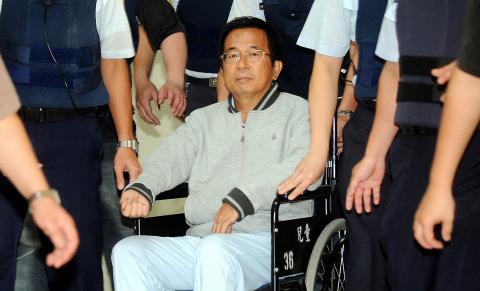The two tumors that had been detected in former president Chen Shui-bian’s (陳水扁) seminal vesicle earlier this year are nonmalignant blood clots, doctors said yesterday after Chen underwent a follow-up medical checkup, adding that they were trying to determine why a third clot had formed.
Chen was granted temporary release from prison so he could get a medical checkup at Chang Gung Hospital’s branch in Linkou District (林口), New Taipei City (新北市), yesterday morning. He was transported from Taipei Prison to the hospital at about 6am.
A group of the former president’s supporters were gathered outside the hospital to show their backing for Chen, shouting “A-bian is innocent” when they saw him arrive.

Photo: Lin Cheng-kung, Taipei Times
National Taiwan University Hospital’s Ko Wen-che (柯文哲), who was asked by Chen’s family to oversee the medical checkup, said a CT scan had shown that Chen’s cardiovascular system was somewhat clogged, but that the condition was not life-threatening.
Ko added that the three clots found in Chen’s seminal vesicle were not malignant. He said the former president was relieved to know that he did not have cancer.
However, doctors were still trying to determine why a third clot had developed so quickly after two were found during checkups last month.
Kuo Cheng-deng (郭正典), another doctor appointed by Chen’s family to perform the checkup, said Chen may have have been lying in a prone position while writing in his small cell for extended periods of time, which appeared to have damaged his knees.
Chen also suffered from gastroesophageal reflux disease and his cholesterol reading is high, doctors said.
He underwent an angiogram at Taoyuan General Hospital in March after complaining of discomfort in his chest.
To resolve those problems, Kuo said, Chen needs a better living environment.
Chen was returned to the prison at 12:50pm.
The Ministry of Justice said Chen underwent an electrocardiogram, CT, MRI, echocardiogram and other checkups.
The former president’s son, Chen Chih-chung (陳致中), appealed to the authorities to grant his father leave from prison to receive further medical treatment.
Chen Chih-chung expressed the hope that his father’s health problems could finally be correctly diagnosed and properly treated because they have persisted for months, leaving the family very anxious.
Various groups in Taiwan and the US have called on the government to release the former president on humanitarian grounds, saying the conditions in prison are contributing to his failing health.
The Ministry of Justice maintains that Chen Shui-bian’s conditions are the same as those of other inmates.
Chen Shui-bian is serving a 17-and-a-half-year prison term on corruption charges.
Additional reporting by CNA and staff writer

SECURITY: As China is ‘reshaping’ Hong Kong’s population, Taiwan must raise the eligibility threshold for applications from Hong Kongers, Chiu Chui-cheng said When Hong Kong and Macau citizens apply for residency in Taiwan, it would be under a new category that includes a “national security observation period,” Mainland Affairs Council (MAC) Minister Chiu Chui-cheng (邱垂正) said yesterday. President William Lai (賴清德) on March 13 announced 17 strategies to counter China’s aggression toward Taiwan, including incorporating national security considerations into the review process for residency applications from Hong Kong and Macau citizens. The situation in Hong Kong is constantly changing, Chiu said to media yesterday on the sidelines of the Taipei Technology Run hosted by the Taipei Neihu Technology Park Development Association. With

CARROT AND STICK: While unrelenting in its military threats, China attracted nearly 40,000 Taiwanese to over 400 business events last year Nearly 40,000 Taiwanese last year joined industry events in China, such as conferences and trade fairs, supported by the Chinese government, a study showed yesterday, as Beijing ramps up a charm offensive toward Taipei alongside military pressure. China has long taken a carrot-and-stick approach to Taiwan, threatening it with the prospect of military action while reaching out to those it believes are amenable to Beijing’s point of view. Taiwanese security officials are wary of what they see as Beijing’s influence campaigns to sway public opinion after Taipei and Beijing gradually resumed travel links halted by the COVID-19 pandemic, but the scale of

A US Marine Corps regiment equipped with Naval Strike Missiles (NSM) is set to participate in the upcoming Balikatan 25 exercise in the Luzon Strait, marking the system’s first-ever deployment in the Philippines. US and Philippine officials have separately confirmed that the Navy Marine Expeditionary Ship Interdiction System (NMESIS) — the mobile launch platform for the Naval Strike Missile — would take part in the joint exercise. The missiles are being deployed to “a strategic first island chain chokepoint” in the waters between Taiwan proper and the Philippines, US-based Naval News reported. “The Luzon Strait and Bashi Channel represent a critical access

Pope Francis is be laid to rest on Saturday after lying in state for three days in St Peter’s Basilica, where the faithful are expected to flock to pay their respects to history’s first Latin American pontiff. The cardinals met yesterday in the Vatican’s synod hall to chart the next steps before a conclave begins to choose Francis’ successor, as condolences poured in from around the world. According to current norms, the conclave must begin between May 5 and 10. The cardinals set the funeral for Saturday at 10am in St Peter’s Square, to be celebrated by the dean of the College